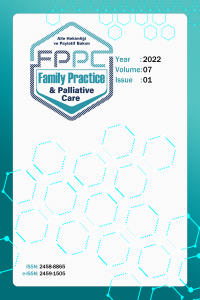Öz
Anahtar Kelimeler
Aile hekimliği Palyatif bakım ağrı opioid analjezikler palyatif bakım eğitimi
Kaynakça
- 1. http://www.who.int/cancer/palliative/definition/en/ (Accessed 01 March 2022)
- 2. Aydogan F, Uygun K. [Palliative treatments in Cancer Patients] (in Turkish). Klinik Gelişim. 2011; 24: 4-9.
- 3. Kabalak AA. Palliative care studies in Turkey. Turkiye Klinikleri J Anest Reanim-Special Topics. 2017;10(1):7-12.
- 4. Ozgul N, Gultekin M, Koc O, Goksel F, Bayraktar G, Ekinci H et al. Turkish community-based palliative care model: a unique design. Annals of Oncology.2012; 23 (3): 76–8. https://doi.org/10.1093/annonc/mds093
- 5. https://khgmozellikli.saglik.gov.tr/svg/palyatif.php (Accessed 01 March 2022)
- 6. Miniksar OH, Korkmaz Disli Z, Tunc Z, Acun Delen L, Honca M. Determination of knowledge and opinions on palliative care of workers in intensive care and palliative care units: a survey study J Tradit Complem Med. 2020;3(1):61-8. https://doi.org/10.5336/jtracom.2019-72380
- 7. Yildizer OF, Ogur S. Knowledge and attitudes of health personnel on palliative care: sample of Bitlis province. J Curr Res Health Sector. 2018; 8 (2), 411-38.
- 8. Bag B. [Palliative care practices in the health system in the case of Germany] (in Turkish). Turk J Oncol. 2012; 27 (3): 142-9. https://doi.org/10.5505/tjoncol.2012.687
- 9. Tanriverdi O, Yavuzsen T, Akman T, Senler FC, Taskoylu BY, Turhal S et al. The Perspective of non-oncologist physicians on patients with metastatic cancer and palliative care (ALONE Study):a study of the palliative care working committee of the Turkish oncology group (TOG). J Canc Educ 2015; 30:253–9. https://doi.org/10.1007/s13187-015-0794-3
- 10. Pelayo M, Cebrian D, Areosa A, Agra Y, Izquierdo JV, Buendia F. Effects of online palliative care training on knowledge, attitude and satisfaction of primary care physicians. BMC Fam Pract.2011; 12:37–47. https://doi.org/10.1186/1471-2296-12-37
- 11. Demir M. Palliative care ethics: Turk J Med Surg Intens Care Med.2016; 7: 62-6. https://doi.org/10.5152/dcbybd.2016.1202
- 12. Uyar M, Cetingok H, Ozyalcin SN. Chronic pain and access to treatment at the end of life. Comm Physician. 2016; 31(1): 18-24.
- 13. Benli AR, Erbesler ZA. Differences on comprehension and practice in palliative care in Turkey. Turk J Fam Pract 2016; 20 (1): 5-6. https://doi.org/10.15511/tahd.15.21605
- 14. Celtek NY, Okan I. [Patient evaluation and scales in palliative care] (in Turkish). Clin Med J Fam Med. 2016; 8(3): 6-11.
- 15. Dirimen Arikan G. Definition and philosophy of palliative care. Clin Med J Fam Med. 2016; 8(3):1-5.
- 16. Vinay P. Rebuttal: should palliative care be a specialty?: no. Can Fam Physician. 2008 ;54(7):974-7.
- 17. Thoonsen B, Gerritzen SHM, Vissers KCP, et al. Training general practitioners contributes to the identification of palliative patients and to multidimensional care provision: secondary outcomes of an RCT. BMJ Support Palliat Care. 2019;9(1):e18. https://doi.org/10.1136/bmjspcare-2015-001031
Öz
Anahtar Kelimeler
Family practice palliative care pain opioid analgesics palliative care training
Kaynakça
- 1. http://www.who.int/cancer/palliative/definition/en/ (Accessed 01 March 2022)
- 2. Aydogan F, Uygun K. [Palliative treatments in Cancer Patients] (in Turkish). Klinik Gelişim. 2011; 24: 4-9.
- 3. Kabalak AA. Palliative care studies in Turkey. Turkiye Klinikleri J Anest Reanim-Special Topics. 2017;10(1):7-12.
- 4. Ozgul N, Gultekin M, Koc O, Goksel F, Bayraktar G, Ekinci H et al. Turkish community-based palliative care model: a unique design. Annals of Oncology.2012; 23 (3): 76–8. https://doi.org/10.1093/annonc/mds093
- 5. https://khgmozellikli.saglik.gov.tr/svg/palyatif.php (Accessed 01 March 2022)
- 6. Miniksar OH, Korkmaz Disli Z, Tunc Z, Acun Delen L, Honca M. Determination of knowledge and opinions on palliative care of workers in intensive care and palliative care units: a survey study J Tradit Complem Med. 2020;3(1):61-8. https://doi.org/10.5336/jtracom.2019-72380
- 7. Yildizer OF, Ogur S. Knowledge and attitudes of health personnel on palliative care: sample of Bitlis province. J Curr Res Health Sector. 2018; 8 (2), 411-38.
- 8. Bag B. [Palliative care practices in the health system in the case of Germany] (in Turkish). Turk J Oncol. 2012; 27 (3): 142-9. https://doi.org/10.5505/tjoncol.2012.687
- 9. Tanriverdi O, Yavuzsen T, Akman T, Senler FC, Taskoylu BY, Turhal S et al. The Perspective of non-oncologist physicians on patients with metastatic cancer and palliative care (ALONE Study):a study of the palliative care working committee of the Turkish oncology group (TOG). J Canc Educ 2015; 30:253–9. https://doi.org/10.1007/s13187-015-0794-3
- 10. Pelayo M, Cebrian D, Areosa A, Agra Y, Izquierdo JV, Buendia F. Effects of online palliative care training on knowledge, attitude and satisfaction of primary care physicians. BMC Fam Pract.2011; 12:37–47. https://doi.org/10.1186/1471-2296-12-37
- 11. Demir M. Palliative care ethics: Turk J Med Surg Intens Care Med.2016; 7: 62-6. https://doi.org/10.5152/dcbybd.2016.1202
- 12. Uyar M, Cetingok H, Ozyalcin SN. Chronic pain and access to treatment at the end of life. Comm Physician. 2016; 31(1): 18-24.
- 13. Benli AR, Erbesler ZA. Differences on comprehension and practice in palliative care in Turkey. Turk J Fam Pract 2016; 20 (1): 5-6. https://doi.org/10.15511/tahd.15.21605
- 14. Celtek NY, Okan I. [Patient evaluation and scales in palliative care] (in Turkish). Clin Med J Fam Med. 2016; 8(3): 6-11.
- 15. Dirimen Arikan G. Definition and philosophy of palliative care. Clin Med J Fam Med. 2016; 8(3):1-5.
- 16. Vinay P. Rebuttal: should palliative care be a specialty?: no. Can Fam Physician. 2008 ;54(7):974-7.
- 17. Thoonsen B, Gerritzen SHM, Vissers KCP, et al. Training general practitioners contributes to the identification of palliative patients and to multidimensional care provision: secondary outcomes of an RCT. BMJ Support Palliat Care. 2019;9(1):e18. https://doi.org/10.1136/bmjspcare-2015-001031
Ayrıntılar
| Birincil Dil | İngilizce |
|---|---|
| Konular | İç Hastalıkları |
| Bölüm | Araştırma Makalesi (Original Article) |
| Yazarlar | |
| Yayımlanma Tarihi | 17 Mart 2022 |
| Gönderilme Tarihi | 9 Ağustos 2021 |
| Kabul Tarihi | 31 Aralık 2021 |
| Yayımlandığı Sayı | Yıl 2022Cilt: 7 Sayı: 1 |


